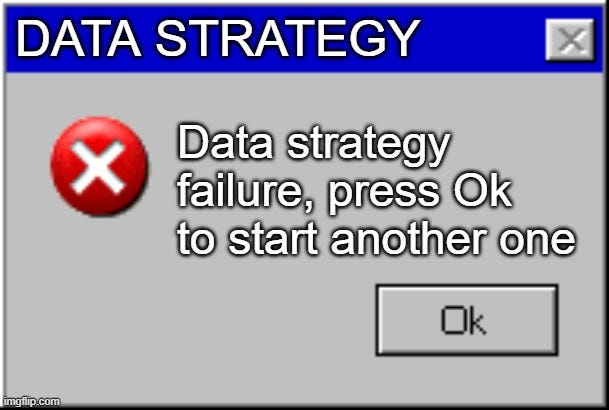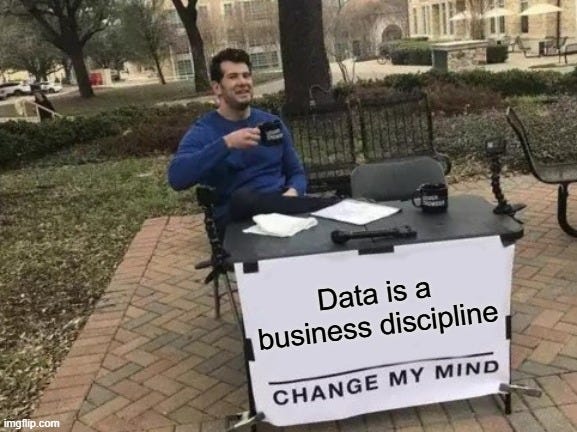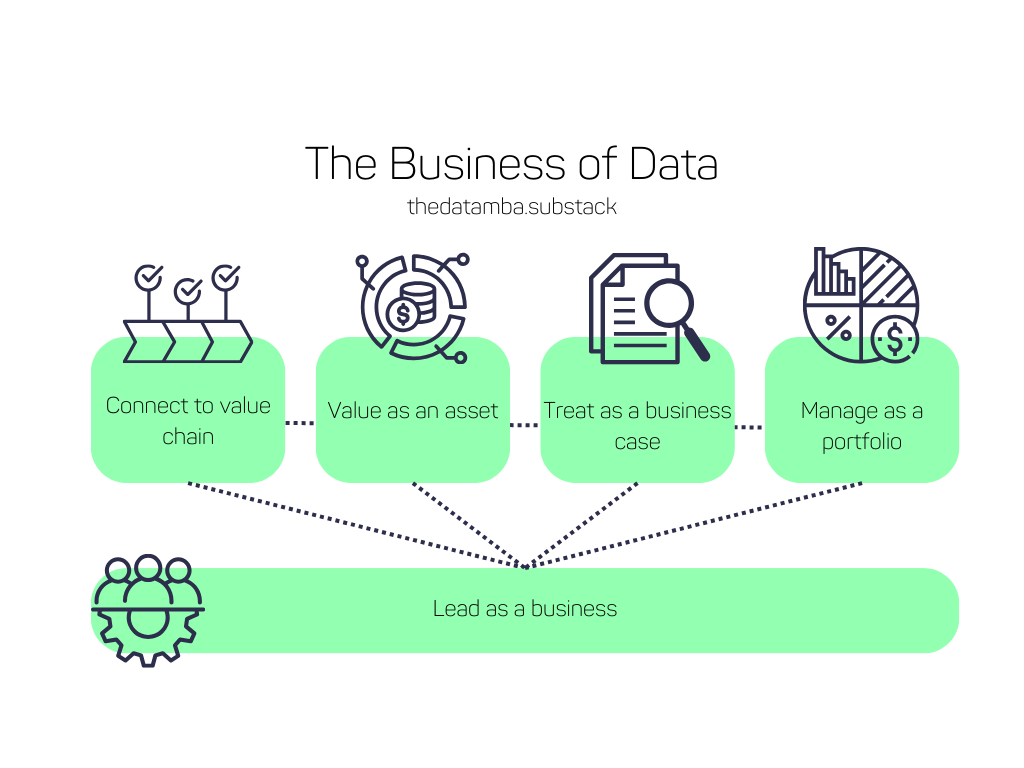Data is a core business discipline
That’s my ditch, and the one I’m prepared to die in, figuratively speaking.
This assertion underpins The Data MBA, a project designed to bring data and business to the same table.
My interest in the business of data stems from two decades of trying to get the most from it, in mostly hybrid technical-commercial roles.
When I’ve seen data initiatives succeed, it is because they’ve been treated first and foremost as business initiatives, rather than just technical ones.
When they’ve failed it is usually because they haven’t.
I’ve had plenty of time to think about this, as part of the generation of early data leaders who rode the digital wave out of the dusty backroom into the plush carpeted boardroom.
This process is still very much in motion, and while data and business may not yet be quite holding hands skipping through sunlit meadows, they are increasingly on speaking terms.
This wasn’t always the case
Early in my career the key challenge was to get people to even care about data. Let alone treat it like a business activity.
Trust me, as the sole data analyst in a company, I was only invited to parties on the proviso I didn’t weird out the business extroverts, with ‘your numbers and stuff.’
(Too many bad memories…)
This was a decade or more before the Harvard Business Review declared the data scientist to be the sexiest job of the 21st Century. When knowing your ‘numbers and stuff’ suddenly became somewhat cooler and better paid.
For the most part, people saw data professionals as backroom wizards, distant from the cut and thrust of the main business, who sometimes reared their pointy heads to throw out numbers and reports, before retreating to stare unblinkingly at MS Access.
(I’m afraid, some data professionals, with their special language, fetish for tools, and decidedly uncommercial ways, have not entirely disavowed their detractors of this caricature).
These days, data does have a standing invite to the board room agenda. While this is for the most part due to the irresistible force of digital transformation, and data’s vital role in this, I still count this as a win for the wizards.
Indeed, I challenge you to find one CEO prepared to admit they see data as unimportant, or one annual report that doesn’t talk about being data driven (or increasingly AI).
Even so, you know a catch is coming
And it is this - there is a country mile sized gap between data rhetoric and data reality.
Data still has some way to go to be treated as a bona fide business discipline.
The evidence for this is everywhere, and none more so than in the trail of failed data strategies and projects to be found in any decent size organisation.
This battle is still being waged.
If data was treated as a business activity, initiatives, be they humble projects or big transformations, wouldn’t fail as often as they do. Depending on your source somewhere between 60% and 90% (Gartner, naturally), of strategies are said to fail.
Whatever the figure, in my experience it is a lot.
Failure tends to be a slow fizzle out, rather than a crash and burn. People often look on with resignation (‘meh, remember that data thing we tried to do, that was expensive’). Rather than feeling bereft, businesses tend to just get on with whatever they did beforehand, at the same or worse level of chaos.
(Urgh..)
Opportunities continue to be missed, and risks avoided by luck rather than judgement.
There are specific reasons for this, which I’ll save for later posts. However, the big one is the abject failure to treat data as a business endeavour.
This is the reason so many data strategies fail to leap off their PowerPoints and light a spark under their organisations.
What does this look like?
You may well have seen it before and there is a good chance that you are seeing this right now.
Most organisations believe data is important, and say it is an asset, but when pressed struggle to define exactly what this means, beyond a vague sense that it plays a key role.
They are hampered by a limited understanding of exactly how data can be used to enable business ambitions and outcomes.
So, data feels important, but it also feels intangible and unknowable. It gets attention at board level but not focus.
This is precisely what we don’t want from a business asset, because it is challenging to focus on anything that feels abstract.
And data is an asset, whichever we cut it. It may be lumped into intangibles, but up to 90% of the value of modern organisations (S&P 500) is said to comprise intangible assets, of which data will be a big part.
The upshot? Most organisations do not have anywhere near enough an accurate understanding of the value of their data, in respect to the outcomes it can drive for their business.
By this I mean, actual tangible, measurable value (the definition of a material asset).
If you don’t know the actual value of your data to your business, you lack the intelligence needed to prioritise how you invest in data to drive your business activities.
And you certainly have no way to predict, and measure return on that investment.
So, you can say data is an asset as much as you like, but this is of little use unless you know to what degree it is an asset for your business.
Attempts to invest in managing data, and associated capabilities, like people, processes, and tools (the stuff data professionals worry about), will be crudely drawn, untargeted, and impact difficult to measure.
Most data strategies are an exercise in trying to shed light on the abstract, but do attempt to prioritise data use cases in line with business objectives.
But the truth is, these data strategies will not be real business plans until we are able to treat those use cases as actual business cases (where we invest in data for return).
True, sometimes we get in right, or the powers that be offer enough goodwill to get away with it.
After all, people do get data budgets signed off.
But this doesn’t last (just look at the short average tenure of Chief Data Officers), and a lack of business clarity inevitably leads to misaligned expectations, disappointment, and increasingly sceptical stakeholders.
The consequence? Data remains too far removed from business outcomes and business leaders struggle to draw a line between data and investment.
And it gets worse…
If people don’t see data as a real material asset, they see no need to bear responsibility for it, beyond the handful of plucky data professionals who are firefighting, churning reports, and not getting invited to parties.
Rather than seeing data as everyone’s responsibility, to some degree, it is seen as a magic, complex, and frustrating endeavour still going on in some dark room somewhere.
And worst, and I really do mean worst of all, rather than being seen as a business discipline it is mentally and even formally filed in the technology bucket.
Black box stuff, too hard, too inaccessible, too abstract, and someone else’ problem.
So, who is this rant for you ask?
Well, I have no doubt some seasoned data professionals will feel a cold shiver of recognition in what they’ve just read, but I’m also looking at you, business folks.
Data professionals make up on average 3% of a typical organisation’s workforce, so they can’t be the only people who give two hoots about this.
I realised, years ago, that data transformation only works, when everyone is onboard. By everyone, I mean the 97% of people in businesses who are not data professionals.
The key to this? People need to see data as the business discipline that it is, something that is tangible rather than abstract.
Tangibility is how we get people to care about it.
I hear too often that ‘the business’ doesn’t care about data – and this usually comes from the mouths of jaded data professionals.
This is partly true, and who can blame them.
But this is because data seems so intangible and abstract. In organisations where people have stuff to do, asking them to care about something that feels so inaccessible is a tall order.
Yet, I’ve never met a business professional who doesn’t want to make incrementally better decisions and actions. These are things we know are reliant on data (and information that comes from it).
The truth is, when data is made material, made tangible, and business focused, people do care. When people see how important data is to the things that matter to them, guess what, they care. They really care.
The task as I see it is to finally get data out of its backroom and a proper seat in the boardroom. And we will only do this by taking an unapologetically business approach.
Data is too important to the essential functions of our organisations, for this not to happen.
(enough said)
So, what does the business of data look like?
Well, there are a handful of principles behind the business of data, as I see them.
Annoyingly (for you), I’m going to save these for future articles.
(Sorry to leave you hanging, but I’m still getting used to this writing lark, and like a toddler I’m easily tired).
As a tease, this is what you can look forward to:
(Here’s five principles, for starters, there could be more)
Principle 1: Connect data to your (business) value chain
Understanding exactly how data drives your business is more than just aligning it to your organisation’s outcomes. It means connecting your data to the things that matter.
Principle 2: Treat data as a material asset
Treating data as an asset means you need to value it and prioritise it.
Principle 3: Turn use cases into business cases
We need to ensure use cases are business cases. This is all about investing in managing and using data, and the associated enablers of people, processes and tools, based on the return that can be expected.
Principle 4: Manage your data portfolio
We need to move from monolithic strategies to adaptive business strategies driven by data. A live portfolio of business activities, where effort and investment in data is up or down weighted dependent on changing outlook and priorities.
Principle 5: Lead data as a business
And finally, every business leader, to a greater or lesser extent, needs to know enough about the business of data to ensure it drives the change they hope for.
There is a lot to unpack in these principles, so I hope you’re looking forward to it as much as this data wizard is.







